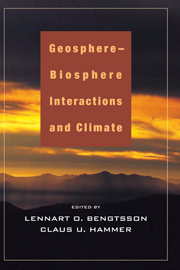Book contents
- Frontmatter
- Contents
- Dedication to Hans Oeschger
- List of Contributors
- Preface
- Introduction
- 1 The Antarctic Ozone Hole, a Human-Caused Chemical Instability in the Stratosphere: What Should We Learn from It?
- PART ONE THE ANTHROPOGENIC PROBLEM
- PART TWO THE HUMAN PERSPECTIVE
- PART THREE MODELING THE EARTH'S SYSTEM
- PART FOUR INFORMATION FROM THE PAST
- PART FIVE HOW TO MEET THE CHALLENGE
- 16 Toward a New Approach to Climate Impact Studies
- 17 Research Objectives of the World Climate Research Programme
- 18 Panel Discussion: Future Research Objectives
- Index
- Plate section
17 - Research Objectives of the World Climate Research Programme
Published online by Cambridge University Press: 04 August 2010
- Frontmatter
- Contents
- Dedication to Hans Oeschger
- List of Contributors
- Preface
- Introduction
- 1 The Antarctic Ozone Hole, a Human-Caused Chemical Instability in the Stratosphere: What Should We Learn from It?
- PART ONE THE ANTHROPOGENIC PROBLEM
- PART TWO THE HUMAN PERSPECTIVE
- PART THREE MODELING THE EARTH'S SYSTEM
- PART FOUR INFORMATION FROM THE PAST
- PART FIVE HOW TO MEET THE CHALLENGE
- 16 Toward a New Approach to Climate Impact Studies
- 17 Research Objectives of the World Climate Research Programme
- 18 Panel Discussion: Future Research Objectives
- Index
- Plate section
Summary
Introduction
The World Climate Research Programme (WCRP) is the research component of the World Climate Programme (WCP). Soon after the launch of WCP at the First World Climate Conference in Geneva in 1979, the World Meteorological Organization (WMO) and the International Council for Scientific Unions (now called International Council for Science) (ICSU) agreed in 1980 on cosponsorship of WCRP. In 1993, the Intergovernmental Oceanographic Commission (IOC) of UNESCO joined WMO and ICSU as the third cosponsor of WCRP. This unique sponsoring structure has attracted both the scientific community and national meteorological, hydrological, and oceanographic services. Therefore, WCRP has developed into a global research program encompassing all those parts that need international climate research cooperation and coordination for a successful outcome.
The Overall Goal
WCRP has a clearly set goal: “To understand and predict – to the extent possible – climate variability and change, including human influences.”
In reaching this overall goal, WCRP must
Design and implement observational and diagnostic research activities that will lead to a quantitative understanding of significant climate processes;
Develop global models capable of simulating the present and past climate and – to the extent possible – of predicting climate variations on a wide range of space and time scales, including the effects of human influences.
- Type
- Chapter
- Information
- Geosphere-Biosphere Interactions and Climate , pp. 280 - 284Publisher: Cambridge University PressPrint publication year: 2001



